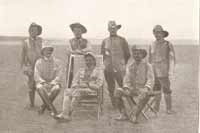Colonial Reports
The Germans
The Germans established their colonial rule
in Mora, Maroua and Madagali beteen1901 and 1903. The colonial reports
of Dominik (1903) and Puttkamer (1904) show that they adopted their
views on the non-islamic population from the Wandala and Fulbe. The
'pagan tribes' (Heidenstaemme) were seen by them as threat for peace
and prosperity in the region. It was Zimmer- mann (1906) who became
critical of this view.
Zimmermann decided to make contact with the 'pagan tribes'. He travelled
the Northern Mandaras between November 1905 and December 1906 (see map
published 1906). Strumpell (1910 and 1922) travels the mountains only
shortly after Zimmerman, and his ethnographic survey and wordlists are
of great value. Puttkamer as well as Strumpell refer to Passarge's work
(1895). The rule of the Germans already ends in 1915/16.
The British
British rule of the western slopes of the
Northern Mandaras began only in 1922 (Kirk-Greene 1958 (1969) and lasted
till independence in 1961, following a referendum which made the Northern
Mandaras part of two nation states. Ethnographic literature during British
times is minimal. The annual reports to the League of Nations and UN
(1927-1961) give evidence that DOs requested unsuccessfully a governmental
anthropologist for an ethnographic survey of the Gwoza Hills.
DO Mathews' (1934) ethnographic survey of the Gwoza Hills is the only
one of its kind, but remains unpublished. The same goes for McBride's
and Shaw's surveys, but they focused more on the hill areas near Madagali.
Published articles are White (1941) and Tupper-Carey (1944). 'Hamman
Yaji's Diary' (1995) needs to be mentioned here as well as Meek's 'Tribal
Studies'. Meek's work only deals with the Madagali hill area.
The French
French military administration between 1916
and 1920 covered the whole of the Northern Mandaras, but little is known
about their activities on the western slopes, for which the British
held a mandate from 1922 onwards. Apart from the British much of the
ethnographic survey work in the French Mandated Territory was published.
In 1935 the Soci't' d'Etudes Camerounaises was founded and published
much of the research.
However, nothing was published before 1935, and we have to search the
Archives Nationales in Yaounde and the Archives d'Outre Mer in Aix-en-Provence
to find out more. Other sources are the 'Rapport Annuel' of the French
government to the League of Nations and the UN (one report from 1950).
What we do know about the early period of the French rule is that, they
too relied solely on the Wandala and Fulbe.
Lavergne (1944) gives an historic account on the 'Poste Mokolo'. Interestingly
enough, it was Hamman Yaji who ordered Mokolo to be founded in 1918.
We assume that one important reason for this was to capture more slaves
and cattle. Mokolo became 'chef-lieu' for a military poste of a 'Region
Mandara' only in 1931. Capitain Vallin (1927, 1931) participated in
pacifying the region. Civil adiministration began 1940 and lasted till
1960.
